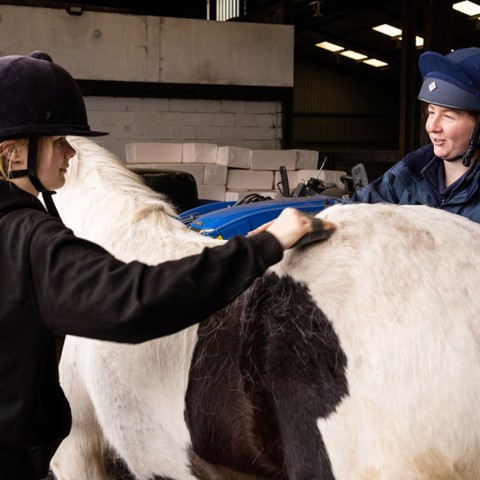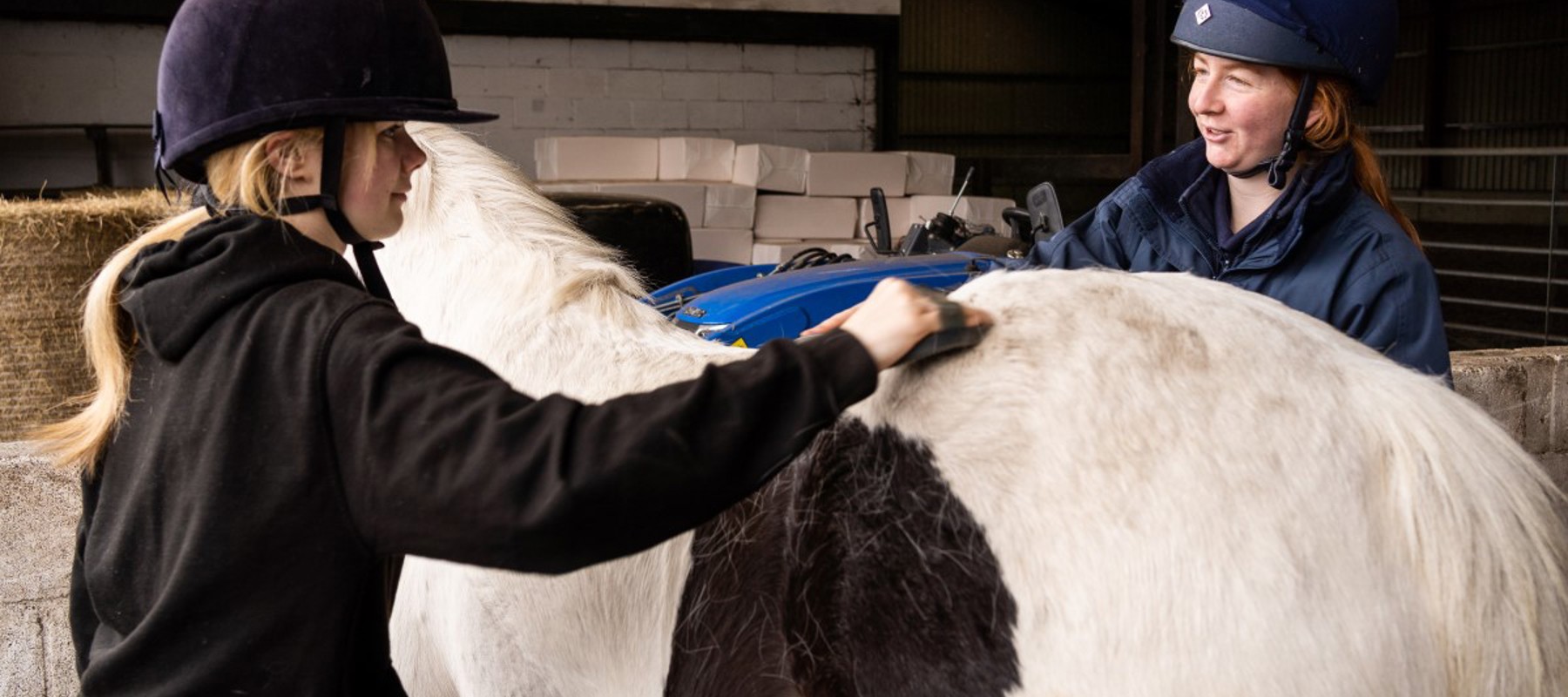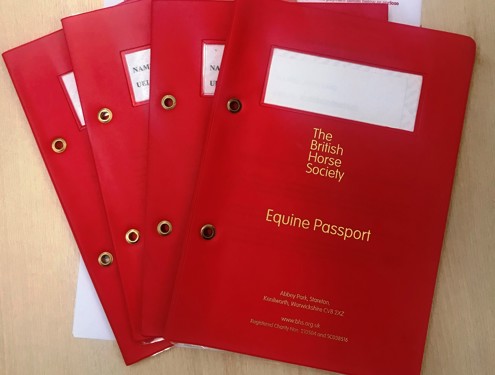



A loan refers to the borrowing or lending of a horse. For the loanee, it’s a less permanent arrangement than purchasing a horse and it can be a fantastic first step towards having a horse of your own. Loaning a horse removes the initial purchase expense, although it still involves many of the same responsibilities as owning.
Loaning allows the owner to maintain ultimate control over their horse’s future, while the loanee takes over the day-to-day work and costs involved.
It’s important that both parties get along to maintain a positive relationship in the interest of the horse. It’s important for the horse’s welfare that owner and loanee can ask each other questions throughout the agreement.
Full Loan – Loanee takes on full financial responsibility and care for the horse. Often moves to a new yard to suit the loanee.
Part loan – Loanee has set days and shares the care of the horse with the owner. The horse will usually stay at the owner’s yard and loanee will pay a contribution towards their upkeep.
Permanent loan – All responsibility and costs will lie with the loanee, and the owner of the horse will retain ownership but with very little involvement day-to-day. Terms would be dependent on the individual contract being agreed upon, but generally, the loan would continue indefinitely so long as the horse was being well cared for.
Many owners find that loaning is the ideal solution for a horse or pony which they don’t wish to sell and want to retain control over their future. This could be for a pony which has been outgrown, if the owner has experienced unforeseen circumstances, or perhaps for a horse which can no longer take part in a specific activity but is suitable for another discipline.
Loaning your horse may seem like a good solution, but make sure it’s a decision you don’t rush into. Consider all the factors first.
Horse Care and Welfare chevron-down chevron-upDoes your horse have a medical condition that needs specialist care or is your horse elderly and going to a companion home? If your horse is going out on loan and it involves being moved to a new yard, assessing their quality of life is strongly recommended to make sure this won’t have a negative impact. Your horse will be out of your day-to-day control, and there have been occasions where horses are loaned to people who were initially judged to be trustworthy but who have sadly neglected their loan horse.
Viewing and Trials chevron-down chevron-upEncourage potential suitable loanees to come and view your horse several times. The horse should be ridden by yourself or someone known to the horse before the loanee. Make sure that the loanee rides the horse and handles them in all scenarios which they may face. Not only will this give you the confidence that the horse and loanee are well suited, but also that your horse will be well looked after and handled in a way in which you’re happy.
Request References chevron-down chevron-upWhen selecting a prospective loan home, always request references from your loanee. This may be from owners they’ve loaned horses from previously or an owner of a horse they’ve provided care for. Alternatively, you might ask for a reference from a previous employer if they’ve worked within the equestrian industry or from their coach or riding centre if the loanee has recent riding experience there.
View the Loan Home chevron-down chevron-upIf your horse is moving to a new yard, make sure that you visit the new home prior to making any final loan agreement. Take a really good look around to make sure that the living environment and conditions are suitable for your horse’s requirements. Consider the safety aspects of yard security, stabling and pasture management. Ask about the daily routine of the yard so you can feel confident that your horse will adjust to their new environment without serious issues.
Regular Contact chevron-down chevron-upOnce the loan agreement is in place, keep in frequent contact with the loanee and visit your horse regularly to check on their health and wellbeing. Ensure that the yard manager also has your contact details.
Public Liability Insurance chevron-down chevron-upPublic Liability Insurance is essential for your loanee as they will be classed as the horse’s keeper and may, therefore, be responsible for any damage that the horse causes to a third party’s person and/or property. Make sure that you have seen evidence that this insurance has been taken out by the loanee. BHS Gold membership includes £30 million of public liability insurance cover.
The prospect of loaning a horse is exciting, but make sure it’s a decision you don’t rush into just because it feels like less commitment than buying a horse. Loaning an equine that turns out to be unsuitable or unsafe can be extremely upsetting and could potentially leave you in a difficult situation, so consider all of the factors before making a final decision.
Time Commitment chevron-down chevron-upCaring for a horse properly is time consuming and you may find it difficult if you’ve underestimated the impact it will have on your daily schedule and all your other commitments.
How much does it cost to loan a horse? chevron-down chevron-upAlthough the initial purchase cost is removed with loaning, the long-term financial commitments are the same: feeding, a targeted worming programme, farrier, dental checks, vaccinations, bedding, forage, public liability insurance, veterinary insurance, livery charges, transport costs, and veterinary fees.
Find the Right Horse chevron-down chevron-upMake a list of all the attributes your ideal horse would have, and the sort of activities you would like to do together, considering your own ability, knowledge and experience. Seek the advice of an Accredited Professional Coach to help you find the perfect horse.
There may be some limitations or specific requests that come with your potential new horse, so make sure that you ask the owner lots of questions. Specific requests may include a certain management practice which needs to be followed, or activities which the horse can’t take part in, for example, jumping.
If you take on a horse with a history of health conditions, which may be ongoing, make sure you research as much as possible. Be realistic in your knowledge and ability to recognise whether you’ll be able to provide the best care for the horse.
If you decide to take on the horse, make sure that the yard you move them to can also cater for their needs. For example, if the horse needs to be fed soaked hay or have their grazing controlled, can the yard provide these facilities?
View and Try the Horse chevron-down chevron-upBefore agreeing to a loan, take the time to handle and ride the horse in the sort of scenarios you’re likely to regularly encounter. Treat this like the trial of a horse you’re viewing to purchase. You may find it useful to think of a list of questions for the owner.
Don’t ride the horse yourself, to begin with – the owner or their representative should ride the horse first while you watch. They should show you the horse in walk, trot, canter and over a jump (if applicable) so that you can observe the horse’s paces and behaviour under saddle. Always put your safety first, and if you or your advisor have any concerns at all about riding the horse yourself, then the horse probably isn’t suitable for you.
Rider insurance for a loan horse chevron-down chevron-upPublic Liability Insurance is essential. As a loanee, you are the horse’s keeper and may therefore be responsible for any damage that the horse causes to a third party’s person and/or property. BHS Gold membership includes £30 million of public liability insurance cover.
Unforeseen Circumstances chevron-down chevron-upConsider how any unforeseen circumstances, such as unemployment or sudden illness, would impact on your ability to care for and keep your loan horse.
Having a loan agreement is an important way of helping to reduce risk and protect all parties involved. The BHS strongly advise that a mutually acceptable written agreement is drawn up and don’t agree to something if you don’t intend to put it into practice. The BHS sample loan agreement can be used as a basic template that you can alter and personalise to your own requirements and circumstances. This is available for anyone to download free of charge, although a donation to our charitable work would be greatly welcomed.
Make sure both parties sign and keep a copy of the loan agreement. The BHS advise that you have your loan agreement checked by a qualified legal adviser. BHS Gold members can make use of the free-of-charge BHS legal helpline for guidance and advice on completing the agreement for their specific circumstances.
If you need advice regarding a breach of the agreement, this is classed as a civil matter and professional legal advice needs to be sought. Unfortunately, the BHS cannot directly help to resolve civil matters.
However, if you’re a BHS Gold member you can get excellent free advice by calling the legal helpline.
Not a member? To gain access to the legal helpline, as well as a host of other benefits, join the BHS now.
The law requires that a passport remains with the horse, so if a loanee moves the horse to a new yard, the loanee must also keep the horse’s passport.
It’s also a legal requirement for all equines in the UK to be microchipped. Owners should make sure that their horse’s microchip number is correctly registered with their Passport Issuing Organisation (PIO). You can check this by searching the Chip Checker and can find out which PIO manages that horse’s passport. If the microchip number is not found, horse owners need to contact their horse’s PIO.
Owners should also inform the PIO that their horse is going out on loan and retain a photocopy of the passport for their records.
Prospective loanees should not accept any horse on loan that isn’t accompanied by a valid and up-to-date passport. Check that the name of the owner you’re loaning the horse from is the current registered owner in the passport.

The Horse Care and Welfare Team are here to help and can offer you further advice with any questions you may have. Contact welfare@bhs.org.uk or call on 02476 840517*. You can also contact us via our social media channels.
*Opening times are 8:35am-5pm from Monday to Thursday and 8:35am-3pm on Friday. *Calls may be recorded for monitoring purposes